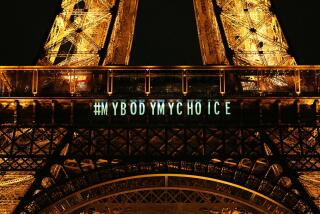In France, feuding over Islamic fashion turns to swimwear
- Share via
PARIS — A punchy jingle kicks off the promotional video of a French firm that sells Islamic women’s swimwear.
Models wearing brightly colored, full-body tunic, pant and hijab combos frolic at the sea’s edge swinging their arms in free-spirited step with the music.
The water-resistant burkinis, outfits that cover everything except a woman’s face, hands and feet, are designed for Muslim women in search of “a little more modesty” so they can “have more freedom to play sports,” according to the manufacturer. But in France, women in burkinis risk more than a few curious stares.
Two weeks ago, a 35-year-old burkini-wearer was barred from a public pool in an eastern Paris suburb, according to the French daily Le Parisien, triggering the latest bout of soul searching over an issue that strikes a deep chord in a nation with a strong secular tradition.
The woman, who converted to Islam at 17, said she was “made to understand” the ban was based on “political problems,” and said she believes she is a victim of religious discrimination. She intends to take her case to court.
Emerainville’s mayor and the pool management contend that the burkini ban was invoked strictly because of hygiene concerns, just as shorts, rather than Speedos, are not allowed, because they can be worn outside the pool area.
“This has nothing to do with Islam,” Mayor Alain Kelyor told Le Parisien, “because the pool rules prohibit swimming while dressed.
“Besides, Islamic bathing suits don’t exist in the Koran,” he concluded.
The case resonates because in France, “most agree that ostentatious religious signs should not be shown in public space,” said Jean Viard, director of the Cevipof political research center at the National Center for Scientific Research.
“We’re afraid of communitarianism,” Viard said, using a term that refers to sticking to one’s own religious or ethnic community. “So any sign of communitarianism that is too strong, repulses us a little.”
Indeed, the swimsuit controversy has drawn a strong reaction from some French lawmakers.
“This is the tip of the fundamentalist iceberg,” National Assembly member Andre Gerin said of the burkini issue, which he claims is part of a “larger national problem” of growing Islamic extremism in France. Wearing the garment in public is a “clear provocation” and “ridiculous,” while helping “undo years of progress toward equal rights for women.”
Gerin, a Communist Party member, is heading a parliamentary panel assessing how the burka (which covers the eyes with a woven mesh) and niqab (which leaves an opening around the eyes) are worn in France.
This fall, the group is expected to advise fellow lawmakers on whether the garments should be banned, an “idea that doesn’t personally shock me,” Gerin said in a phone interview.
In June, President Nicolas Sarkozy said the burka was “not welcome” in France.
“In our country we cannot accept women prisoners behind a wire fence, cut off from all social life, deprived of all identity,” he told Parliament.
Muslim groups fear that the parliamentary panel has already made up its mind to impose a ban.
“They say [the committee] is objective, but we already know what they think about” the burka, said Benabdellah Soufari, president of an association that helps French Muslims make religious pilgrimages. “When Sarkozy says the burka is a problem for the ‘dignity of women,’ it means he’s already finished his investigation.”
The burkini wearer, who would identify herself only as Carole, told journalists that she called several pools to find out whether they allowed Islamic swimsuits.
After being rebuffed elsewhere, she went to Emerainville, where she initially was given access because there was apparently no rule against the practice. Four days later, she was barred from returning.
Her “only battle,” she has told reporters, is “simply to be able to swim with my children in a pool.”
--
Lauter is a special correspondent.
More to Read
Sign up for Essential California
The most important California stories and recommendations in your inbox every morning.
You may occasionally receive promotional content from the Los Angeles Times.










